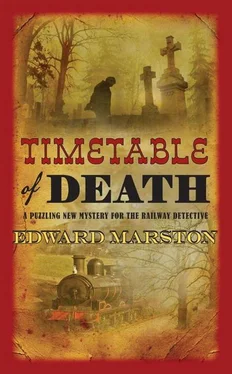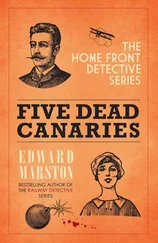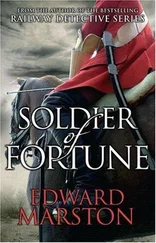Edward Marston - Timetable of Death
Здесь есть возможность читать онлайн «Edward Marston - Timetable of Death» весь текст электронной книги совершенно бесплатно (целиком полную версию без сокращений). В некоторых случаях можно слушать аудио, скачать через торрент в формате fb2 и присутствует краткое содержание. Год выпуска: 2015, ISBN: 2015, Издательство: ALLISON & BUSBY, Жанр: Исторический детектив, на английском языке. Описание произведения, (предисловие) а так же отзывы посетителей доступны на портале библиотеки ЛибКат.
- Название:Timetable of Death
- Автор:
- Издательство:ALLISON & BUSBY
- Жанр:
- Год:2015
- ISBN:9780749018122
- Рейтинг книги:4 / 5. Голосов: 1
-
Избранное:Добавить в избранное
- Отзывы:
-
Ваша оценка:
- 80
- 1
- 2
- 3
- 4
- 5
Timetable of Death: краткое содержание, описание и аннотация
Предлагаем к чтению аннотацию, описание, краткое содержание или предисловие (зависит от того, что написал сам автор книги «Timetable of Death»). Если вы не нашли необходимую информацию о книге — напишите в комментариях, мы постараемся отыскать её.
Timetable of Death — читать онлайн бесплатно полную книгу (весь текст) целиком
Ниже представлен текст книги, разбитый по страницам. Система сохранения места последней прочитанной страницы, позволяет с удобством читать онлайн бесплатно книгу «Timetable of Death», без необходимости каждый раз заново искать на чём Вы остановились. Поставьте закладку, и сможете в любой момент перейти на страницу, на которой закончили чтение.
Интервал:
Закладка:
‘Except that he can’t play cricket for this county any more,’ said Lucas, sadly.
‘He’s bound to regret that.’
Stanley was irritated. ‘Let’s not talk about that despicable man,’ he said, peevishly. ‘We’re well rid of him. I want to know why it is taking you so infernally long to gather evidence.’
‘The killer left no discernible trail, sir.’
‘Have you come all the way from Derby to tell us that?’
‘No,’ said Colbeck, ‘I came to ask you a favour.’
‘If we can be of any assistance,’ said Lucas, helpfully, ‘we will.’
‘That depends what you want,’ added Stanley. ‘We can’t have you poking around here at a time like this. I’m sure you understand that.’
‘I do, sir.’
‘So what is it that you’re after?’
‘I need permission to speak to your coachman.’ The brothers were baffled. ‘I assume that he used to drive your father to and from the station on a regular basis. Who, therefore, is in a better position to tell me about his movements?’
‘Cleary can’t help you,’ said Stanley.
‘You never know,’ argued Lucas.
‘I’ve spoken to him myself. He has no idea where Father was going on the day of the murder. Talking to him would be pointless.’
‘Nevertheless,’ said Colbeck, ‘I’d value a word with him.’
‘I have no objection,’ said Lucas. ‘Stanley?’
‘Is it really necessary?’ asked his brother.
‘It’s what brought me here, sir. You’re welcome to be present, of course, and that goes for both of you. Well?’ asked Colbeck. ‘Do I have your permission?’
Leeming’s rooted dislike of train journeys was intensified by the fact that he had to share a compartment with a garrulous farmer whose clothing gave off such powerful agricultural vapours that the sergeant had a fit of coughing. Fortunately, the man gave him no opportunity to speak and that was a blessing because Leeming found his broad Derbyshire dialect almost impenetrable. What he did gather was that the major landowners were the Strutt family, who owned the local cotton mills, and that they’d complained about the projected railway line so strongly that its direction was radically altered. Leeming could see through the window that the construction must have been a highly expensive process because the train passed through a long, deep cutting and passed no less than eleven bridges within a mile. The Strutt family, he suspected, would not have been popular with the North Midland Railway, as it was at the time.
Glad to escape the stench of the soil and the interminable lecture in a foreign language, Leeming made his way towards the centre of Belper. It didn’t take him long to find the shop owned by Reuben Wigg. When he stepped into it, he was greeted by a blend of bewitching aromas. Superintendent Wigg and his brother bore little resemblance to each other. While the policeman was hirsute, the pharmacist was singularly lacking in hair. Bald-headed and clean-shaven, Reuben Wigg wore a white coat and an expression of severe disapproval. His brother had patently monopolised all of the arrogance allotted to the family and left a residue of umbrage for the pharmacist.
Before Leeming could speak, a customer came into the shop and was served first. After his departure, the sergeant was able to introduce himself and state his business, only to be interrupted by two more customers. When it happened for a third time, he asked if he could speak to Wigg in private. The pharmacist reluctantly called his assistant into the shop before taking his visitor into a back room with an even more pleasing pungency. Leeming asked the question that had brought him there.
‘Have you ever sold poison to your brother?’
‘No, I haven’t.’
‘Is that the truth?’
‘I haven’t sold anything to Elijah,’ said the other, ‘for one simple reason. He doesn’t think he’d have to pay. Because I’m his brother, he expects to get everything free. You can’t run a business like that.’
‘How often do you see him?’
‘We see precious little of him.’
‘I have the feeling that you’re rather glad about that.’
‘Elijah and I are not the best of friends, Sergeant.’
‘Why is that?’
‘It’s a personal matter.’
‘Has he ever asked you for advice about poisons?’
‘Why should he? There are pharmacists in Derby.’
‘Yes, but you’re his brother.’
‘Only in name,’ said Wigg, sourly. ‘In answer to your question, I’ve never sold Elijah any poison but there have been many times when I’ve been tempted to administer some to him.’ The bell tinkled as someone else came into the shop. ‘I’ll have to go, Sergeant. My customers rely on me.’
Leeming was deflated. All that he’d gained from his visit was the news that the Wigg brothers were hostile to each other. Trudging back towards the railway station, he hoped that Colbeck and Tallis would have more productive encounters.
John Cleary was cleaning some harnesses when Lucas Quayle arrived with Colbeck in tow. After introducing the two men to each other, Lucas left them alone. Cleary put the harness aside and wiped his hands on a cloth.
‘I’m told that you’re a good cricketer,’ said Colbeck.
Cleary smiled. ‘I do my best, sir.’
‘You and Gerard Burns were outstanding.’
‘Ah, well, we’ve lost him, I’m afraid.’
‘Are you sorry about that?’
‘Very sorry.’
‘Why is that?’
‘Gerard was a friend. There are not too many of those around here.’
‘Have you played any cricket matches since he left?’
‘Yes, sir — we lost them all.’
Cleary was saddened rather than embittered. Since he excelled at cricket, the game was important to him and he’d enjoyed a run of success in the past. Without Gerard Burns in the side, the team was condemned to a series of losses.
‘What I’m trying to find out,’ explained Colbeck, ‘is where Mr Quayle went on the day of his murder. You drive him to the railway station, I understand.’
‘That’s true, Inspector, but he never said where he was going that day.’
‘Where did he usually go?’
‘Oh, he went to his office in Derby, even on Sundays sometimes.’
‘Did he catch a particular train?’
‘Yes, he kept to a strict timetable,’ replied Cleary. ‘Mr Quayle always caught the same train in the morning and if he needed me to meet him in the evening he’d tell me what time to be there.’
Colbeck warmed to the man. The coachman answered questions without hesitation and looked him in the eye as he did so. There was no hint of the evasion he’d met elsewhere. Cleary wanted to help.
‘What sort of a man was Mr Quayle?’
‘I’m not the best person to ask that, sir.’
‘Why not? You saw him almost every day.’
‘Yes, but all he did was to give me my orders. In all the years I’ve been here, we never talked properly. Don’t misunderstand me,’ he went on, ‘I had the greatest respect for Mr Quayle. He was a good employer and treated me well but I never really got to know him as a person.’ He waved an arm that took in the stable yard. ‘This is where I belong, sir.’
‘I’m not asking you to tell tales about him, Mr Cleary.’
‘There are none to tell.’
‘What about his row with Mr Burns? I’d call that a tale worth hearing.’
‘All I know is that we lost a good gardener and a decent man. Not that I’m taking sides,’ said Cleary, quickly. ‘Mr Quayle did what he felt was right. I’ve no argument with that.’ He removed his cap and ran a hand through his hair. ‘But I do miss Gerard on the cricket field. I’ve never seen a bowler like him.’
‘Has he ever been back here?’
‘No, Inspector.’
Читать дальшеИнтервал:
Закладка:
Похожие книги на «Timetable of Death»
Представляем Вашему вниманию похожие книги на «Timetable of Death» списком для выбора. Мы отобрали схожую по названию и смыслу литературу в надежде предоставить читателям больше вариантов отыскать новые, интересные, ещё непрочитанные произведения.
Обсуждение, отзывы о книге «Timetable of Death» и просто собственные мнения читателей. Оставьте ваши комментарии, напишите, что Вы думаете о произведении, его смысле или главных героях. Укажите что конкретно понравилось, а что нет, и почему Вы так считаете.












